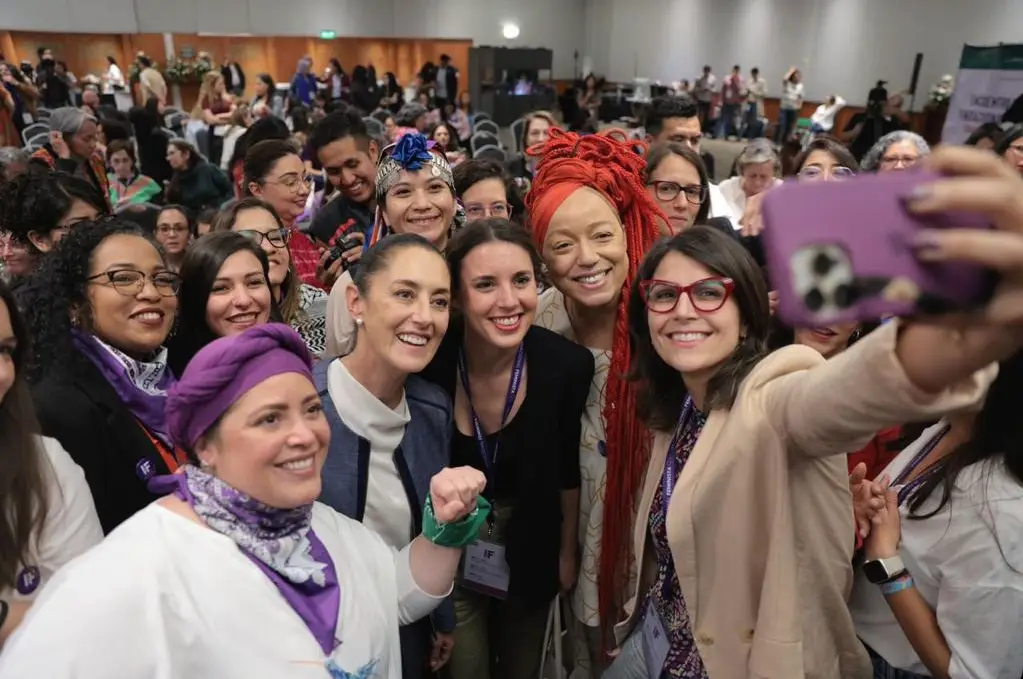When a president from an underrepresented background is elected to office, there is often an implicit expectation that they will champion the rights of their own community. Claudia Sheinbaum’s landslide victory in Mexico last year was no exception. As the first woman to lead a North American nation, Sheinbaum’s ascension kindled tentative optimism at home and abroad. Her campaign leaned heavily into feminist messaging, with slogans like “It’s time for women” suggesting a potential new chapter for a country where an average of 10 women are murdered each day.
But eight months into her six-year term, that early optimism is beginning to sour. Far from ushering in a new era of gender justice, Sheinbaum’s administration has overseen devastating budget cuts to women’s services, maintained a pattern of violently suppressing feminist protests, and offered a conspicuously-muted response to the recent surge of violence in Jalisco.
Viewed collectively, these actions have raised pressing questions about whether symbolic representation is being used as a substitute for substantive reform.
Pesos speak louder than words
If pesos speak louder than words, then Sheinbaum’s first federal budget tells a troubling story. Despite campaign rhetoric positioning her administration as committed to enhancing women’s rights, the 2025 spending plan mirrors the targeted austerity patterns of her predecessor.
Key gender-focused programs are facing major cuts, with a particularly heavy blow dealt to women’s shelters. Considering that the number of women using these services increased by 75 percent between 2023 and 2024, the 4.3 percent reduction in funding for 2025 can only spell disaster.
The newly planned Ministry for Women––intended to bring gender policy to the highest levels of government––is likewise blighted by a lack of resources which might enable it to carry out its function. Its predecessor, the National Institute for Women, also saw a notable budget reduction.
At the same time, the national agency responsible for preventing violence against women, CONAVIM, faces significant cuts. While overall funding for gender-related programs has increased, the vast majority is directed toward broad social initiatives, leaving only a tiny fraction specifically dedicated to combating violence and discrimination. In a country where over 70 percent of women and girls over the age of 15 have experienced some form of violence at least once in their lives, civil society warns that these cuts aren’t just disappointing—they could be deadly.
“Provocations”, not protests
Claudia Sheinbaum’s tenure as the Head of Government for Mexico City between 2018 – 2023 was marked by repeated clashes with feminist movements, drawing criticism for police crackdowns on protests and a litigious onslaught against activists. Rather than dismantling repressive police forces as she initially pledged, her administration continued to militarise public spaces and violently suppress feminist marches.
A 2021 report by Amnesty International found that more than a dozen women and girls were arbitrarily detained across several Mexican cities, including the capital, for peacefully taking part in feminist protests in 2020. Under Claudia Sheinbaum’s leadership as Mayor of Mexico City, authorities faced widespread allegations of using excessive force against demonstrators—deploying tear gas and employing crowd-control tactics such as kettling—particularly during the 2020 protests calling for the legalisation of abortion.
In the aftermath of the demonstrations, Sheinbaum relentlessly pursued other young feminist activists through the courts, in a move seen by many as an effort to intimidate and silence the movement. Despite the overwhelmingly peaceful nature of the demonstrations, Sheinbaum framed them as “provocations”, thereby justifying a heavy-handed police response.
By casting the feminist movement in a negative light, the former-Mayor’s rhetoric has fostered an environment in which women’s activism can be easily dismissed as recalcitrant thuggery. This, in turn, leads both officials and members of the public to feel justified in responding to the protests with hostility or aggression.
Unchecked violence
Despite Sheinbaum’s bold pre-election claims that she is “the only one who can show results in security,” 50 percent of respondents in a recent poll affirmed that they believe public security has worsened or continued to go poorly since the MORENA party candidate assumed the presidency last October.
The suspected femicide of beauty influencer Valeria Márquez during a TikTok live stream on 13 May is the latest in a string of violent scandals which have contributed to this perception. Live from her beauty salon in Zapopan, Jalisco, 23-year-old Valeria and chatted nervously to the camera as she waited for an anonymous gift to arrive. A few moments later, the assassin––posing as a delivery driver––entered the salon, firing several rounds into Valeria’s head and chest as her followers watched on in horror.
This was not the first time in recent months that Jalisco’s rising tide of violence made global news. On 5 March, a cartel training ground and mass grave was discovered in Teuchitlán, just 50 kilometres from where Valeria was killed. Hundreds of shoes and make-shift cremation ovens left little doubt that the ranch had doubled as an extermination site, but Sheinbaum’s Attorney General was quick to deny the presence of human remains at the ranch.
Likewise, following Valeria’s murder, state authorities claimed that there was “no evidence” to suggest that the presumed femicide was linked to organised crime, despite acknowledging that the murder was most likely the work of a hitman. Such repeated attempts on behalf of the Sheinbaum administration to obscure the extent of cartel violence to save face––in combination with her spurious and damaging claim that femicide rates dropped by 40 percent during López Obrador’s leadership––serve to minimise the intersecting crises of organised crime and gender-based violence, ultimately eroding public trust and hindering meaningful action on either front.
Exactly one week after Valeria’s murder, the wave of violence engulfing Jalisco reached the capital—this time striking at the very heart of MORENA. Ximena Guzmán and José Muñoz, two of Mexico City Mayor Clara Brugada’s closest aides, were gunned down last Tuesday morning on their way to work in what appears to be yet another targeted assassination.
As the investigation into the double homicide proceeds in near-total silence, it remains to be seen whether the President’s defining strategy—deny, deny, deny—will now be applied to the fate of her own party faithful.
Being female does not a feminist president make
Claudia Sheinbaum’s presidency was heralded as a watershed moment—a chance to redefine what leadership could look like in a country beleaguered by ubiquitous gender-based violence. But approaching a year in, the gap between promise and policy is growing larger all the time.
The defunding of vital support systems for women, the criminalization of feminist resistance, and the administration’s failure to address the brutal convergence of cartel and gender violence have demonstrated that simply being female does not a feminist president make. As the realities of her governance unfold, it becomes increasingly clear that representation without action is not progress—it’s performative politics masquerading as equality.












